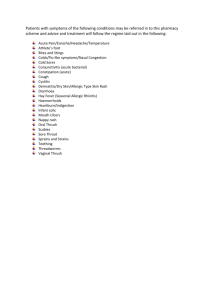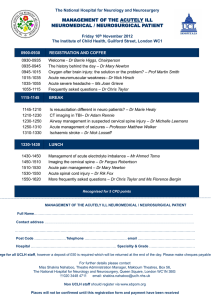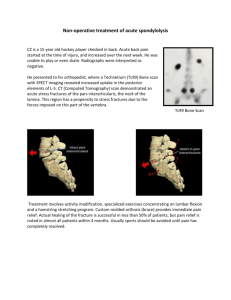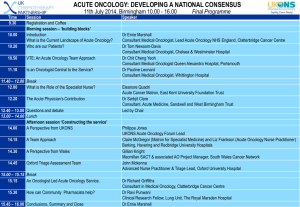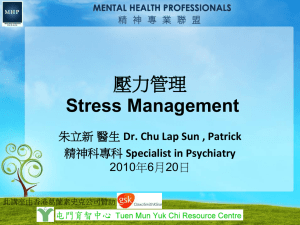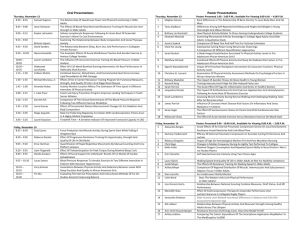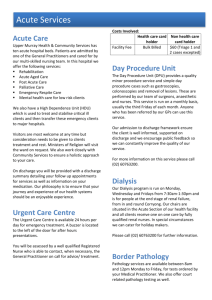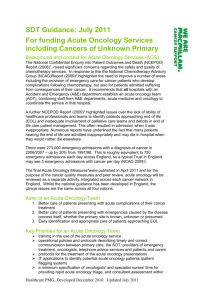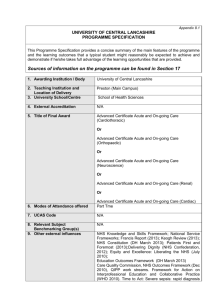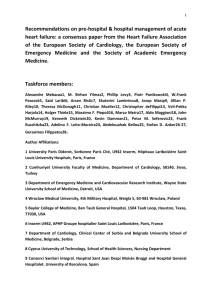module details - Activating your university user account
advertisement
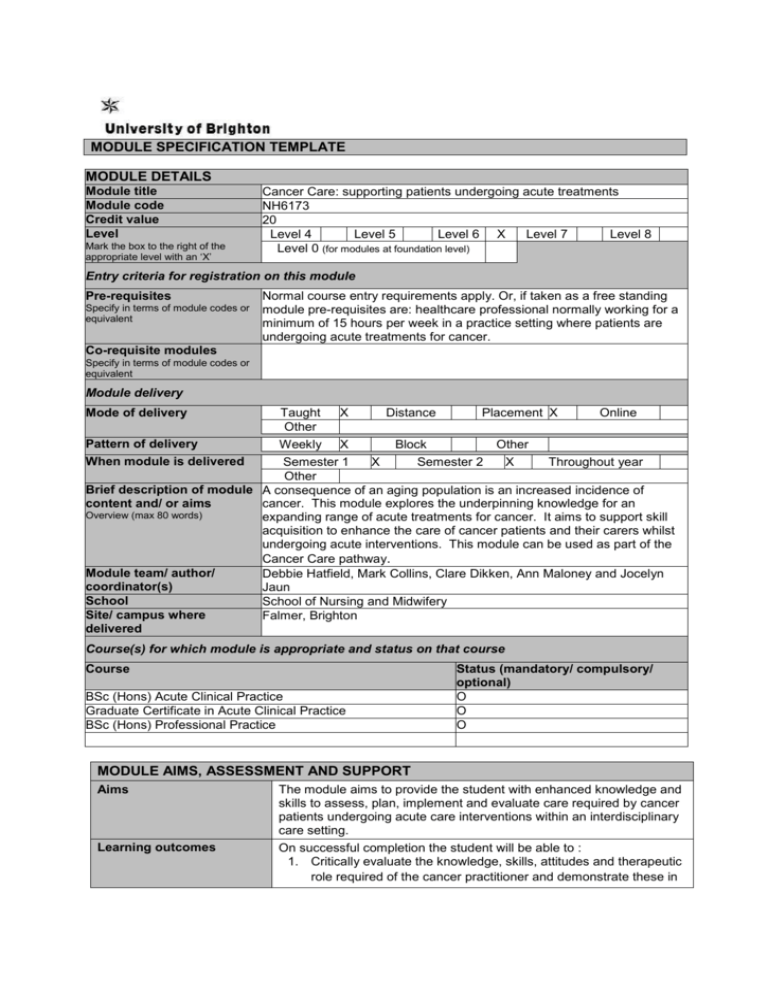
MODULE SPECIFICATION TEMPLATE MODULE DETAILS Module title Module code Credit value Level Mark the box to the right of the appropriate level with an ‘X’ Cancer Care: supporting patients undergoing acute treatments NH6173 20 Level 4 Level 5 Level 6 X Level 7 Level 8 Level 0 (for modules at foundation level) Entry criteria for registration on this module Pre-requisites Specify in terms of module codes or equivalent Normal course entry requirements apply. Or, if taken as a free standing module pre-requisites are: healthcare professional normally working for a minimum of 15 hours per week in a practice setting where patients are undergoing acute treatments for cancer. Co-requisite modules Specify in terms of module codes or equivalent Module delivery Mode of delivery Taught X Distance Placement X Online Other Pattern of delivery Weekly X Block Other When module is delivered Semester 1 X Semester 2 X Throughout year Other Brief description of module A consequence of an aging population is an increased incidence of content and/ or aims cancer. This module explores the underpinning knowledge for an Overview (max 80 words) expanding range of acute treatments for cancer. It aims to support skill acquisition to enhance the care of cancer patients and their carers whilst undergoing acute interventions. This module can be used as part of the Cancer Care pathway. Module team/ author/ Debbie Hatfield, Mark Collins, Clare Dikken, Ann Maloney and Jocelyn coordinator(s) Jaun School School of Nursing and Midwifery Site/ campus where Falmer, Brighton delivered Course(s) for which module is appropriate and status on that course Course BSc (Hons) Acute Clinical Practice Graduate Certificate in Acute Clinical Practice BSc (Hons) Professional Practice Status (mandatory/ compulsory/ optional) O O O MODULE AIMS, ASSESSMENT AND SUPPORT Aims Learning outcomes The module aims to provide the student with enhanced knowledge and skills to assess, plan, implement and evaluate care required by cancer patients undergoing acute care interventions within an interdisciplinary care setting. On successful completion the student will be able to : 1. Critically evaluate the knowledge, skills, attitudes and therapeutic role required of the cancer practitioner and demonstrate these in practice. 2. Exemplify ethical practice which takes into account the diversity of patient experience including cultural and spiritual issues. 3. Critically discuss the different treatment modalities and the rationale behind their use. 4. Anticipate the likely patient response to treatment and take measures to reduce adverse symptoms and experiences, communicating this effectively to the patient and health care team. 5. Contribute to the evaluation of the effectiveness of treatment and patient outcomes through participation in multi disciplinary review, audit and research endeavours. 6. Critically reflect on the processes of advancing the practice of cancer care. Content Standards and frameworks governing cancer practice and the therapeutic role of the cancer practitioner Developing skills for expert cancer practice including: assessment, communication and interpersonal skills, health education and promotion, patient advocacy for individuals and groups, inter-professional working and autonomy in practice, supporting self. Overview of common malignancies, their presentation and symptoms. Treatment modalities, indications for use and success criteria including enhanced recovery after surgery (ERAS) Treatment specific problems, symptoms and their management in relation to surgery, chemotherapy, radiotherapy, endocrine, biological and gene therapies. Acute oncology service and cancer emergencies Symptom control in all stages of cancer development including fatigue, nausea and vomiting, weight management and diet, pain, sexual functioning and body image. Psychological impact of cancer and recognition of adverse effects requiring additional intervention such as Cognitive Behavioural Therapy and solution focussed therapy. Hope, loss, grief, bereavement and managing survivorship transitions including to Amber Care and End of Life Care. Role and use of complementary therapies. Clinical trials for evidence-based practice, gaining access and patient outcomes Learning support Service user perspectives and information prescriptions Text books: Latest editions of the following texts: Dark, G. G. 2013. Oncology at a Glance. Chichester: WileyBlackwell Fawcett, J Tonks N and McQueen, A. (eds) 2011. Perspectives on Cancer Care. Chichester: Wiley-Blackwell Palmieri, C., R. Simcock and E. Bird (eds) 2013. ABC of Cancer Care. BMJ Books Shaw, C. (ed) 2011. Nutrition and Cancer. Wiley-Blackwell Tobias, J.and D Hochhauser 2010 Cancer and it’s Management. 6th edition. Chichester: Wiley-Blackwell. Websites: http://www.cancernursing.org/index.asp www.cancerindex.org. http://www.mycancertreatment.nhs.uk/ Journals: British Journal of Cancer Cancer Nursing Practice European Journal of Oncology Nursing European Journal of Cancer Care Teaching and learning activities Details of teaching and learning activities A variety of teaching methods including: Lectures Group work Guided study Online activities via studentcentral – blogs Simulation for use of complementary therapies Skills rehearsal and formative feedback from Mentor in practice Allocation of study hours (indicative) Study hours Where 10 credits = 100 learning hours SCHEDULED GUIDED INDEPENDENT This is an indication of the number of hours students can expect to spend in scheduled teaching activities including lectures, seminars, tutorials, project supervision, demonstrations, practical classes and workshops, supervised time in workshops/ studios, fieldwork, external visits, and work-based learning. All students are expected to undertake guided 48 52 STUDY independent study which includes wider reading/ practice, follow-up work, the completion of assessment tasks, and revisions. PLACEMENT The placement is a specific type of learning away from the University that is not work-based learning or a year abroad. TOTAL STUDY HOURS 100 200 Assessment tasks Details of assessment for this module The assessment consists of two parts: parts one and two. Both parts must be passed in order to pass the module 1. Theory – 50% 2,500 word case study. Pass mark 40% Using a patient case study approach the student will evaluate an aspect of the management of the cancer patient undergoing intensive treatment. The topic will be negotiated with the module leader. (LO 1,2,3 and 6) 2.Clinical practice – 50% Skills inventory. Pass mark 40%. Students will be required to undertake six clinical skills assessments conducted by their practice placement Mentor. Students select from 10 skills in the inventory. (LO 1,2,4, 5 and 6) Types of assessment task1 % weighting Indicative list of summative assessment tasks which lead to the award of credit or which are required for progression. (or indicate if component is pass/fail) WRITTEN COURSEWORK Essay 50% PRACTICAL Six skills from Skills Inventory 50% EXAMINATION INFORMATION Area examination board Undergraduate CPE (Acute Clinical Practice) AEB Refer to Faculty Office for guidance in completing the following sections External examiners Name 1 Position and institution Date appointed Date tenure Set exercises, which assess the application of knowledge or analytical, problem-solving or evaluative skills, are included under the type of assessment most appropriate to the particular task. Michelle Brown University of Derby September 2012 ends Oct 2016 QUALITY ASSURANCE Date of first approval June 2008 Only complete where this is not the first version Date of last revision April 2010 Only complete where this is not the first version Date of approval for this version Version number Modules replaced June 2013 3 (old code NH3129) Specify codes of modules for which this is a replacement Available as free-standing module? Yes X No
